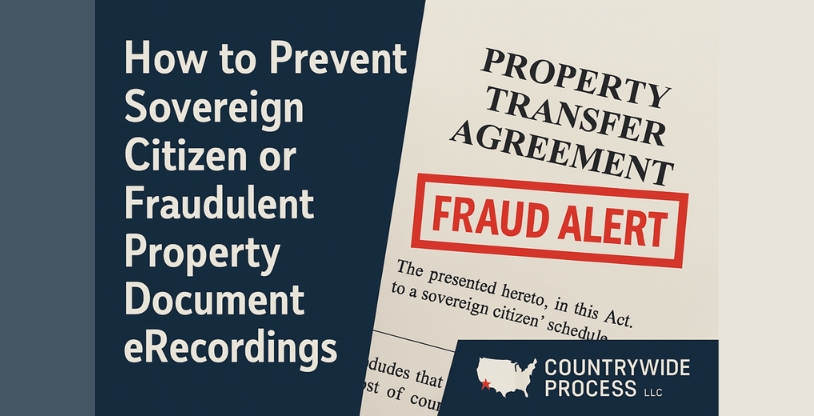
Countrywide Process
October 08, 2025
Across the United States, fraudulent property document recordings—often filed by individuals tied to the “sovereign citizen” movement—pose serious risks to counties, property owners, and public officials.
While these filings have no legal merit, they often look legitimate enough to meet basic filing requirements. Once recorded, they can create chaos: clouding property titles, triggering costly litigation, intimidating public officials, and even exposing communities to safety risks.
At Countrywide Process, LLC, our position is firm:
Fraudulent or sovereign citizen–style property documents will never be accepted for eRecording.
If these documents are submitted at all, they must be presented physically at the county recorder’s office, which Countrywide Process LLC is still willing to deliver on a client’s behalf, where the County Recorder’s staff can apply closer scrutiny and enforce compliance with state and federal law.
To strengthen compliance nationwide, Countrywide Process, LLC requires all clients to acknowledge compliance before submitting documents for eRecording:
This safeguard ensures that responsibility stays with the filer, not the recording channel.
When questionable circumstances arise, the only path forward is physical submission at the county recorder’s office. This allows:
Property owners can also take proactive steps:
Filings from sovereign citizens, which may or may not be fraudulent in nature, represent a nationwide risk—tying up county resources, targeting officials, harming property owners, and endangering public safety.
That’s why Countrywide Process, LLC, enforces a nationwide rule:
Such documents are never accepted for eRecording.
Instead, they must be filed physically with the county recorder, where they can be thoroughly reviewed. By requiring every client to acknowledge compliance before submission, we protect our clients, our counties, and the integrity of property records nationwide.
No. Countrywide Process, LLC blocks all fraudulent or sovereign citizen–related property filings from eRecording nationwide..
The filer must physically submit it at the county office, and they assume liability for any damages, penalties, or criminal consequences.
Physical submission allows county staff to apply stricter scrutiny and refer suspicious documents to law enforcement.
Yes. Every client must confirm their filing does not pertain to a sovereign citizen–style document before submitting through Countrywide Process, LLC.
In many states, knowingly filing a false or forged document is a felony—for example, California Penal Code §115 PC.